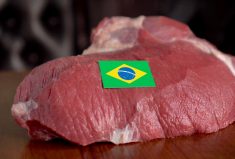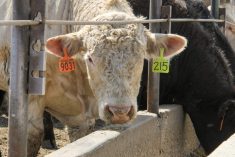The cattle sector is less than pleased by a Health Canada proposal that would put a ‘high saturated fat’ label on retail ground beef.
The proposal is part of a suite of changes proposed for Canada’s Food and Drug Regulations. As well as adding a front-of-packaging (FOP) label requirement for foods deemed by Health Canada to be high in sodium, sugar or saturated fat, amendments would also update nutrient content claims on food labels, increase mandatory vitamin D content of milk and margarine and tighten rules on the use of partially hydrogenated oils.
Read Also

Ample supplies and improved livestock sector to boost Canadian feed sector: FCC
Abundant feed grain supplies and improved profitability for the livestock sector should support strong feed demand and sales through the winter, says a new report from Farm Credit Canada.
“It is anticipated that this proposal would improve Canadians’ access to easy-to-use information on foods high in sodium, sugars and/or saturated fat to help reduce excessive consumption of these nutrients,” Health Canada wrote on an information page on the issue.
“There may be positive impacts including reductions in risk of disease due to improved nutrition and health care savings as a result. Some industry stakeholders may choose to reformulate impacted products to avoid a front-of-package nutrition symbol.”
When the department first proposed FOP label rules in 2018, it said raw single-ingredient meats, poultry and fish that aren’t ground would be exempted since those products “are considered less standardized than ground meats, which make deriving accurate nutrient values challenging.”
Whole and partly skimmed milk and whole eggs were also exempted from the proposed rules. The department did note some businesses would incur more costs due to additional labelling.
The Canadian Cattlemen’s Association (CCA) on Wednesday released a statement urging Health Canada to also exempt ground beef. In it, the CCA argued that the policy would treat ground beef differently from “other nutritious foods, such as single-ingredient meat, milk, eggs, vegetables, and fruit.”
“Canadians consume approximately half of their calories from low nutrient, ultra-processed foods,” the statement read. “By contrast, ground beef is a nutrient-dense protein that contributes iron, zinc, and vitamin B12. FOP labelling of whole, single-ingredient foods starkly contrast with the foundational principles of healthy eating and will distract from the real priority — Canadians need to reduce their consumption of ultra-processed foods.”
The CCA argued that the reduction in saturated fat consumption would be “nominal” if ground pork and beef were taken out of the equation, while cooling consumption of those meats might lead to less iron intake and tie into food security issues, given current inflation and food affordability.
The association further argued that other countries with FOP rules have exempted ground beef. “To our knowledge, Canada will be the only jurisdiction in the world placing a health warning label on its ground beef.”
The federal opposition Conservatives on Tuesday aired similar concerns, saying the European Union, Mexico and Israel have all exempted single-ingredient whole foods from similar FOP labelling policies.
The party’s ag critics — MPs John Barlow, Dave Epp and Richard Lehoux — said in a joint statement the government’s decision “will undercut Canadian producers both domestically and abroad.”
The U.S. government, they said, “has already identified this policy as a trade irritant potentially leading to fewer exports of Canadian beef.”
As for the current exemptions, they added, “it doesn’t make sense if roast beef and whole hams are exempt, but the same source of protein is no longer acceptable after being ground.”
Health Canada hopes to have the new rules in force by Jan. 1, 2026.
— By Manitoba Co-ooperator and Glacier FarmMedia Network staff.















